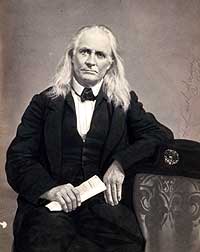
Edmund Ruffin (1794-1865)
Edmund Ruffin is renown on two counts: He was one of the most famous American agriculturalists of his time. He is also said to have fired the first shot of the Civil War. In both arenas he was an outspoken, independent trailblazer.
Aside from his many advances in farming techniques (and they had a tremendous impact on our country's history; he was called the "Father of Soil Chemistry"), arguably one of his more important contributions is a diary he kept from the year 1856 to 1865. As an outspoken secessionist, his strongly opinionated entries give us an unique view of important events of the era. His first hand accounts of the hanging of John Brown, the signing of the first Ordinance of Secession, and the beginning volleys of the war are invaluable. He saw many of the defining moments in the struggle between the states personally, and his overwhelming allegiance to the south had dire consequences for him and his family.
Edmund Ruffin was born in Prince George County, Virginia, on January 5, 1794. In 1810-1812 he attended William and Mary college. In 1813 he took over management of his recently deceased father's tobacco plantation. Like other tidewater farmlands, it had declined greatly in productivity owing to single-crop agriculture, overuse, and poor farming methods. Though lacking any background in scientific agriculture, Ruffin set about investigating the causes and cures of soil depletion. He found that Southern soils had become so acid that they could not retain fertilizers.
In 1818 Ruffin presented a paper—later (1821) expanded into an article for American Farmer and eventually into a highly influential book, An Essay on Calcareous Manures (1832)—in which he explained how applications of calcareous earths (marl) reduced soil acidity. Even more persuasive were Ruffin's enhanced yields of corn and wheat on lands fertilized, plowed, planted, rotated, and drained according to his instructions.
From 1833 to 1842 Ruffin published and largely wrote an agricultural journal, the Farmer's Register. He served in the Virginia legislature, was secretary of the state board of agriculture, was the agricultural surveyor of South Carolina, and became the president of the Virginia State Agricultural Society in 1852. Throughout the 1820s, 1830s, and 1840s, he wrote numerous articles and pamphlets and gave many speeches on the benefits of scientific agriculture in the South.
As the sectional conflict intensified during the 1850s, however, Ruffin turned his attention more and more to defending slavery, largely on racial grounds. In 1857 he published The Political Economy of Slavery, in which he contrasted favourably Southern chattel servitude with Northern free labour. His Anticipations of the Future in 1860 called for secession and predicted a happy and prosperous independent South.
Edmund Ruffin of Virginia was sixty-five at the time of John Brown's raid at Harpers Ferry. Years before he had made his reputation as the South's leading agricultural reformer. Now he was regarded as one of his region's foremost agitators for secession. On December 2, 1859, he witnessed Brown's execution in Charles Town, Virginia. In a borrowed overcoat of the Virginia Military Institute, he stood shoulder to shoulder with the institute's cadets, who were more than a little amused to have an old man with shaggy hair temporarily join their ranks. Afterward Ruffin arranged to have one of Brown's pikes (intended for the use of slave insurgents) sent to each governor of a slaveholding state, with the label "Sample of the favors designed for us by our Northern Brethren."
Ruffin welcomed the start of sectional hostilities in April 1861. A state-rights advocate and secessionist, he left Virginia for Charleston, determined not to support the newly-elected President Lincoln. He attended conventions in Virginia, Florida, and Tennessee to promote secession of all Southern States. In Charleston, he served the Confederate cause by serving as an honorary member of the Palmetto Guards that fired on Fort Sumter on the morning of April 12, 1861 under the commander of General G.T. Beauregard. Allegedly as the oldest member he was selected by his comrades to fire the first gun.
Yet the war that began so hopefully for Ruffin left him bitter at the end. With his Virginia plantation despoiled, his slaves set free, and the Southern cause lost, after General Robert E. Lee's surrender to General U. S. Grant at Appomattox on April 9, 1865, Ruffin realized his dreams of a thriving Confederate Nation would never come to pass. On June 17, 1865 at his estate of Redmoor, in Amelia county, Virginia, he pulled the trigger on his silver-mounted gun and joined other fallen Confederate soldiers, the casualty of what some call the "last shot of the Civil War." His last words reinforced his defiance to Yankee rule: "I here declare my unmitigated hatred to Yankee rule—to all political, social and business connection with the Yankees and to the Yankee race. Would that I could impress these sentiments, in their full force, on every living Southerner and bequeath them to every one yet to be born! May such sentiments be held universally in the outraged and down-trodden South, though in silence and stillness, until the now far-distant day shall arrive for just retribution for Yankee usurpation, oppression and atrocious outrages, and for deliverance and vengeance for the now ruined, subjugated and enslaved Southern States! . . . And now with my latest writing and utterance, and with what will be near my latest breath, I here repeat and would willingly proclaim my unmitigated hatred to Yankee rule—to all political, social and business connections with Yankees, and the perfidious, malignant and vile Yankee race."